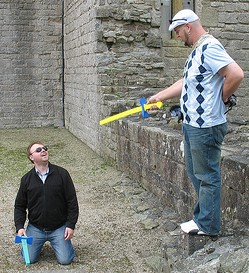For the purposes of this article, I define a “couple” is two adults involved in a relationship … any form of relationship.
Whilst some assume that ‘couple counselling’ is only for couples in an intimate (meaning sexual) relationship, because a couple relationship does not have to be sexual, marital or a civil-partnership, then couple counselling is also not exclusively for those only in such relationships.
Couple counselling can be very helpful to platonic relationships.
By “platonic relationships” I would include:
- Business partners.
- House-mates / flat-mates.
- Neighbours.
- Friends.
- Parent and (adult) child.
- Brothers / Sisters.
- Family members
- … any relationship where two people are involved with each other and who wish to change.
And using family systems theory as his model, Dean Richardson’s Systemic Couple Counselling for Platonic Relationships is ideal for non-intimate couple relationships wishing to change their relationship behaviour.
Systemic Couple Counselling.
Systemic couple counselling is a process that assists two people in a partnership to focus upon their relationship with a view to learning how to change the relationship for both parties’ benefit.
By being deeply interested and curious into how a relationship works, a couple (who may arrive with the story “we’ve tried everything already, how can counselling help us when we’ve already tried everything?”) can be assisted in seeing new avenues and new approaches that they had not been able to see before.
And, for platonic partners intimacy & sexual congress will likely not be a topic for discussion – though if the couple wish to discuss this too them this is available in couple counselling.
What we do in Counselling for Platonic Relationships.
- Conversation: we use verbal communication to discuss the relationship and the changes to be negotiated.
- Diagrams: we can use drawings (such as the Ishikawa Diagram) to visually outline how the relationship works.
- Genograms: we can diagram family trees to document the individual’s relations’ behaviour, allowing us to identify patterns from our families of origins that are being replayed in this relationship (see Wikipedia Genogram article).
- Role playing: we can act out different scenarios to see how they work (or don’t work). The therapist may take on the role of one or the other partner in order to participate in changing the current relationship patterns (the observing partner can watch a different approach & be invited to comment).
- Role Reversal: inviting both parties to swap seats and repeat something (such as a recent argument) playing the role of the other partner. This helps both parties see how they are perceived (and misunderstood/understood) by the other, inviting a conversation about what has been mis-communicated.
- Separation: couple counselling is not bound in keeping a couple together. If the couple are looking for a way to separate whilst negotiating responsibilities in the separation, couple counselling will support this process too.
- Perturbation: whilst learning how the current relationship works, we aim to disturb (or ‘perturb’) the relationship behaviour to make room for new ways of behaviour and relating.
Couple Counselling is not Facilitation, Mentoring or Mediation (and vice-versa).
… but there are similarities and important over-lapping areas (in this table ‘counsellor’ refers to a [tooltip text='Systemic therapy is a branch of psychotherapy that works with families and couples in intimate and platonic relationships to nurture change and development. It tends to view change in terms of the systems of interaction between family members.
http://en.wikipedia.org/wiki/Family_therapy'] systemic [/tooltip] couple counsellor).
| Mediation. | Counselling. | |
| Mediation is a structured process that can be restricted to a small number of sessions. | Counselling can be structured too, but tends to invite the couple to decide upon the structure they wish to work in. The work tends to work on the focus of the relationship problem, rather than a set number of sessions, ending with both parties agree the work has been done. | |
| Mediation focuses on the future: how both parties would like things to be rather than have any detailed knowledge of the past. | In addition to looking to the future, counselling includes a curiosity towards how the relationship came into being how it is now. This is to support couple’s learning what contributed to the relationship’s current status, in order that the couple can put in places processes to manage recurrences. | |
| A mediator does not overtly try to influence the participants or the outcome. | The counsellor keeps the same neutral stance, but may also opt (with the couple’s permission) to “play” the part of one partner in a discussion with the other. This allows both partners to witness a process different to their own, and invites curiosity towards the different approaches. | |
| A mediator relies on both parties being present. | The counsellor also requires both parties be present, but if it has been discussed with the couple first, meeting with one (either or both) partner on their own can be helpful provided that the other partner is brought up to date about what was discussed later on. | |
| A mediator doesn’t explore a person’s feelings in any depth. | The counsellor may explore feelings to the depths acceptable by both partners, so that either partner can learn something of how the other partner functions in response to their partner. | |
| A mediator aims for clear agreement between the parties and how they will deal with specific issues. | The counsellor also aims for clear agreements between the couple, except to get there the counsellor would assist the couple in helping them learn & understand how their relationship currently works; by being focussed on the couple’s relationship the parties can learn how to change behaviours to alter the relationship. | |
| A mediator remains neutral. | The counsellor also remains neural, whilst also being supportive of both individuals and the relationship. |
It’s interesting to note that a mediator’s professional role appears to be a subset of a professional couple counsellor’s role and, of course, a couple may choose one approach over the other:-
Marriage counseling typically brings couples or partners together for joint therapy sessions. The pathology of the marital breakdown is explored and analyzed.
Marriage mediation is practical, agreement-oriented and detail-oriented. When a couple identifies specific areas of conflict on which to focus, they learn to use the mediation process to find points of agreement and negotiate conflict-reducing resolutions. Through the process of marriage mediation, couples will be developing and practicing cooperative, respectful, constructive ways of communicating and reaching accord.
(Citations from http://marriage-mediation.com/ sourced February 2nd, 2012).
… and as I am writing as a systemic & object-relations orientated couple counsellor, Marriage Mediation’s expression of marriage mediation is precisely a subset of the skills that I include in my professional role as a couple counsellor.
Dean Richardson’s development from Non-Counselling to Counselling Professional.
As this article’s author, it is my position that mediation skills are a subset of counselling skills (albeit both approaches have an important place on their own). It is therefore interesting to notice my own development as a mediator/facilitator/coach towards practising as a professional couple counsellor…
I began as an IBM-trained business facilitator and coach.
Originally trained in the mid 1990s, my role as business facilitator was to attend meetings that had nothing to do with my own department/business (hence maintaining neutrality) and assist the meeting attendees to identify problem that got in the way of work issues and work through the problems to a resolution that the meeting attendees wanted. By the end of the 1990s, I took the role of head of the IBM UK Facilitator’s Network.
In the late 1990s and early 2000s, IBM UK introduced the concept of coaching & mentoring. I trained to became one of a team of business coaches; the role of the coaches was to meet with certain IBM employees, whom management had identified, to support and assist the employees in aspects of their careers.
It was these roles that began my journey into becoming a BACP accredited counsellor/psychotherapist – and it’s these skills of a counsellor – and in particular my qualification in couple counselling – that I offers to couples (platonic or intimate) who are seeking assistance with their relationship (read more about Dean’s professional qualifications & experience as a couple counsellor…).
Where is Couple Counselling for Platonic Relationships Available?
Couple counselling for platonic relationships is available from Dean Richardson as follows:-
- Portsmouth & Southsea (Hampshire): face-to-face meetings centred on the south coast in Southsea (click for location information).
- Skype: video camera conference meetings using three Skype devices – idea for people who are in separate places, even remote countries (click for Skype information).
What to do next…
If you are involved in a platonic relationship with another person, that relationship is causing distress and both you and the other party would like to work on changing the relationship, make contact with Dean Richardson today to discuss options.



